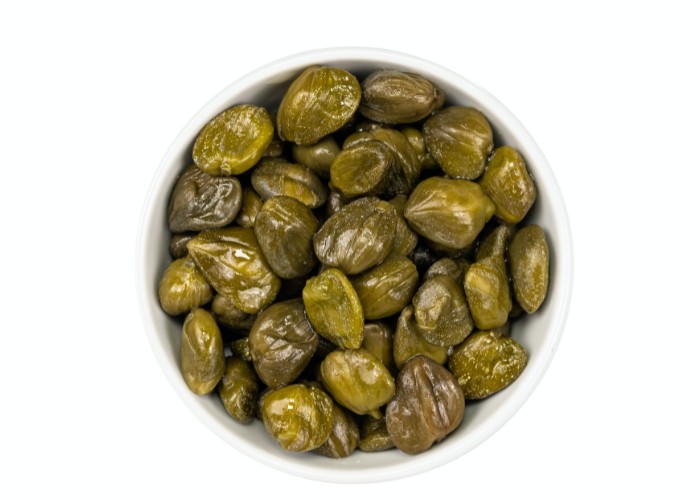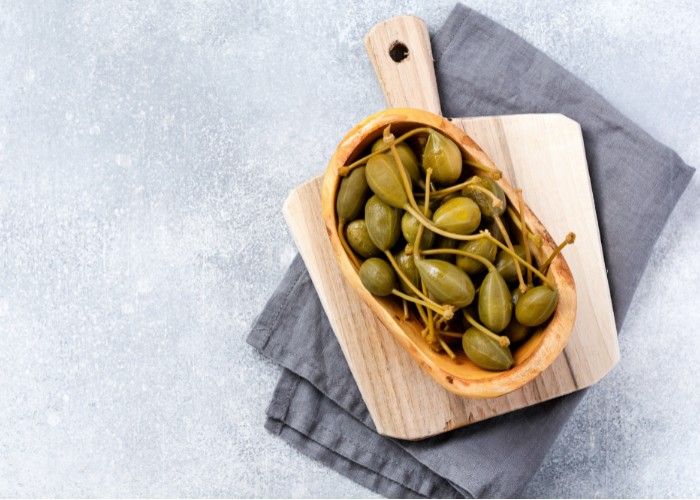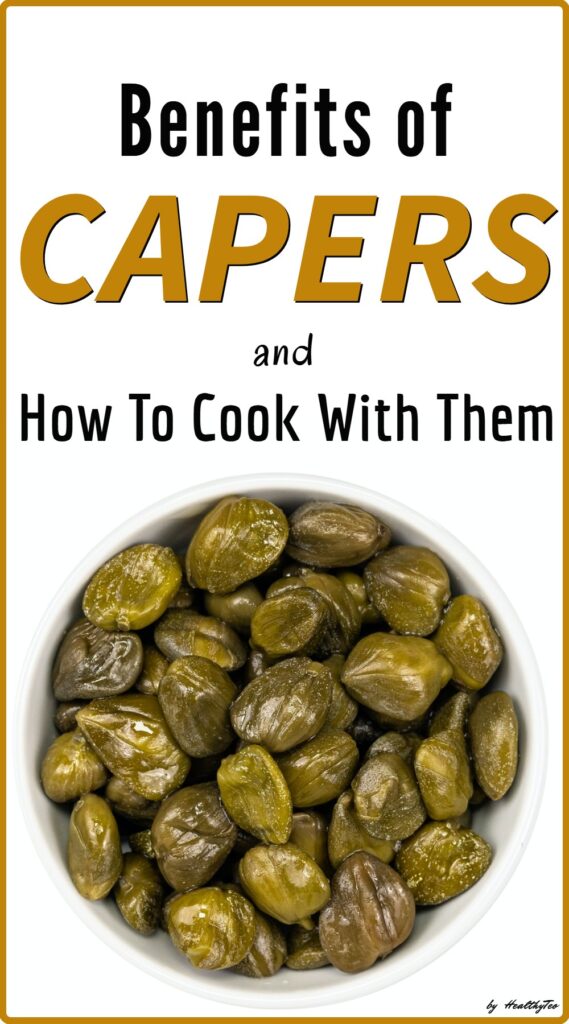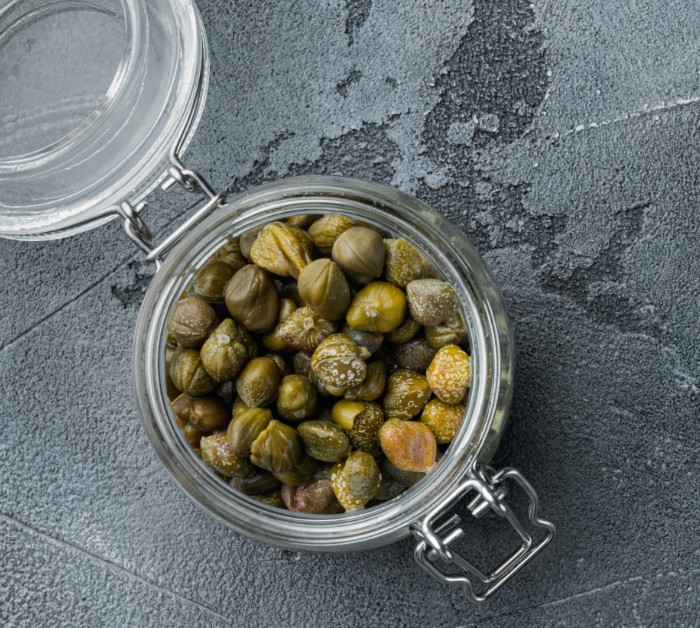Capers: Benefits, culinary uses and potential side effects
Capers make everything you cook taste impressive. You should add them to your meals not just for the great taste but also for the benefits of capers that we will discuss in this article.
The main benefits of adding cappers into your diet are:
- Capers are low in calories and high in fiber
- Excellent source of vitamin K
- Rich in antioxidants
- Good food source of iron, copper, calcium
These are just the main things why capers are good for you. We will show you more about the benefits of capers and the potential side effects of eating too many down here. Also, you can learn how to use them for cooking and what is the difference between capers and non-pareil capers!
Before that let’s see some interesting facts about caper:
- Harvesting capers is an arduous process because they can only be picked by hand. It’s what makes them so expensive.
- Caper is used in the cosmetic industry for the manufacture of various creams and hair care products.
- They are distinctive ingredient in Itlian cuisine, esspecially in Sicilian, Aeolian, and southern Italian cooking.
- Capers are categorized and sold by size, with the smallest sizes being the most desirable.
This post may contain affiliate links, which means we may receive a small commission, at no cost to you, if you make a purchase through a link. For more information, please see our disclosure.
What are capers?
Capers are the immature, unripened, green flower buds of the caper bush Capparis spinosa or Capparis inermis. Capparis shrubs grow all over the Mediterranean. Its use dates back to 2,000 B.C. where is mentioned as food in the Sumerian Epic of Gilgamesh.
To turn the unripened bud into the salty pea-sized ball, the bud is dried in the sun and then pickled in vinegar, brine, wine, or salt.

Are capers the same as caperberries?
Although they do both come from the caper bush they are different things. Capers are the unopened bud and caperberries are the fruits that are harvested later in the season.
Caperberries have very small seeds inside that are similar to kiwi seeds. You can eat both of them and caperberries are often used as an interesting garnish for bloody mary cocktails and martini.

Capers nutrition facts
According to the USDA, 100 grams of canned capers provide:
- Energy: 23 kcal
- Protein: 2.36 g
- Total fat: 0.86 g
- Carbohydrate: 4.89 g
- Dietary fiber: 3.2 g
- Vitamin K: 24.6 mcg
- Vitamin E: 0.88 mg
- Calcium: 40 mg
- Copper: 0.374 mg
- Iron: 1.67 mg
- Magnesium: 33 mg
- Sodim: 2954 mg
Capers are very low in calories and they provide a good amount of several key nutrients. As we can see from the nutritional chart, capers are high in fiber, sodium, and vitamin K – as well as several micronutrients such as iron and copper.
Things to watch for
Depending on how they are prepared and stored, capers can be a major source of sodium. This is the reason why you should consume them in limited quantities as a source of flavor for nutritious meals.
Benefits of capers
Capers enhance flavor and are an excellent option for people looking to cut calories but still enjoy tasty meals.
Beyond these capers provide a variety of health benefits such as:
May stabilize blood sugar
One of the major benefits of cappers is that they are rich in fiber. Adding capers to your diet is a great way to bump up fiber intake. Fiber helps slow the absorption of sugar in the bloodstream to keep blood sugar levels stable in the long term and promote glycemic control.
A 100 grams of canned capers provide about 3.2 grams of fiber which is a great amount (total dietary fiber intake should be 25 to 30 grams a day from food).
Furthermore, some research has found that certain components of the caper plant may have anti-diabetic properties as well. A study from 2013 published in Complementary Therapies in Medicine found that caper fruit extract was effective at lowering blood sugar in people with diabetes.
This study is promising but was conducted by using caper fruit extract. So, more research is needed on how capers can affect blood sugar in the amounts found in food. This promising research shows that capers could be a beneficial addition to a diabetic diet plan.
Antioxidant powers
Free radicals can build up in the body to damage DNA, proteins, and important fatty molecules. Antioxidant compounds present in capers can prevent this.
The most abundant antioxidant molecules of capers are:
- rutin
- quercetin
- kaempferol
- pronathocyanidins
- carotenoids
- Vitamin E and C
Capers are one of the plant sources of flavonoid compounds rutin and quercetin. They are the largest source of rutin, 100 grams contain 332 mg of this compound.
Rutin helps in the smooth circulation of blood and it can be very helpful in treating strained blood vessels.
Also, capers are very rich in quercetin second only to tea leaf. Quercetin has analgesic, anti-inflammatory, and antibacterial properties.
Good source of vitamin K
Another benefit of consuming capers is their high vitamin K content. Adults need approximately 1 microgram a day of vitamin K for each kilogram of their body weight. For example, a person who weighs 75 kg would need 75 micrograms a day.
A single ounce (28g) of capers provides about 9% of the daily recommended intake. Vitamin K is especially important when it comes to blood clotting.
This vitamin is necessary for the function of several proteins involved in the process of coagulation. It is vital for preventing excess bleeding to promote recovery and healing.
In addition to this when paired with other vitamin K foods such as leafy greens, Brussel sprouts, adding capers to your daily diet may help maintain bone health.
A 2013 study published in the American Journal of Clinical Nutrition showed that a low intake of vitamin K in the diet was associated with low bone mineral density.
Rich in minerals
Capers are rich in minerals like copper, iron, calcium, and high levels of sodium. The high sodium level is mainly due to the addition of sea salt in the brine.
- Copper combines with certain proteins to produce enzymes that act as catalysts to help a number of body functions.
- Calcium helps in building stronger teeth and bones.
- Iron helps our muscle to store and use oxygen. it’s part of many enzymes that help our body to digest food.
Potential risks and side effects of capers
Capers are rich in sodium and eating too much can easily put you over your daily limit. A common sign of eating excess capers is extreme thirst. So try to consume it in moderate amounts.
If you suffer from high blood pressure you should avoid eating capers. Excess sodium increases blood volume since it retains water.
To decrease the amount of sodium in each serving of capers it is good to soak them from 3 to 5 minutes and then rinse them thoroughly. This helps remove excess salt and reduce sodium intake. It also helps bring out their unique flavor and aroma.
Allergy: Another possible side effect of capers is that they contain a chemical that is also found in mustard oil. If you are allergic to mustard oil be cautious when trying capers.
Pregnancy and breastfeeding: There isn’t enough information to know if capers are safe to use when pregnant or breastfeeding. It is better to avoid them when pregnant or breastfeeding.
Difference between capers and “non-pareil” capers
Capers are sold by size. The smallest caper will have the most delicate texture and better flavor. A larger caper is more acidic.
The smaller the caper the more delicate in texture and flavor it is. The smallest variety of capers is about 1/4-inch or 7 mm in diameter. It is from the south of France. Called French non-pareil, they are the most prized and come with an equally noticeable price tag.
Non-pareil capers are the best in flavor and texture. If the jar does not say “non-pareil” your capers will be a little tougher, larger, and not as delicate.
You can order capers from Amazon here, and our choice is these non-pareil capers, perfect for seasoning or garnish.
Culinary uses of capers

Capers make everything you cook taste fancy and impressive with very little effort on your part. They are used in the Mediterranean region for various recipes.
They bring a pop of briny, funky brightness to savory dishes like the popular Chicken Picatta. Capers are added near the end of cooking like fresh herbs, to maintain their flavor and snappy texture.
They are also added to salads, including pasta, chicken, or potato salad. Mostly are used as condiment or garnish, or chopped finely for dressings and sauces. Capers can also be cooked with roasted vegetables or used as a pizza topping.
The burst of salt and acid is a great complement to fish. Here is a suggestion on how to use capers to make a sauce for fish in this Fish with Lemon and Caper Sauce recipe.
The caper brine can be used too. You can try it in place of olive juice in your dirty martini, add some to mayo-based dressings in place of vinegar or citrus juice.
Furthermore, today capers are popular food thanks to the Sirtfood Diet. This diet helped famous singer-songwriter, Adele, to lose weight. They belong to the top 20 Sirt-foods that are the base of this popular diet.
How to cook with capers
Capers have a strong taste, so it is good to find a balance in the recipe so it doesn’t overwhelm the flavors of the finished dish.
Before using from the jar it is recommended to rinse the capers to remove some of the salt or vinegar. This will allow the true flavor of the caper to come through.
If you use larger capers it is good to chop them before using them. Most recipes require adding them to the hot pan with other ingredients, typically toward the end of the cooking process. This helps to keep their shape and maintain their taste.
If you want to find out more on how to cook with capers, here are 10 ways to cook with capers.
Final thoughts about the benefits of capers and how to use them
The caper plant produces edible flower buds known as the caper. There is a difference between caper and caperberries. Capers are the unopened bud and caperberries are the fruits that are harvested later in the season.
There are many reasons why capers are good for you. Here are the main benefits of capers:
- Low in calories
- High in fiber
- Great source of vitamin K
- Rich in antioxidants
- Good source of copper, iron, calcium
- May stabilize blood sugar
- May help maintain bone health
Despite the fact that they are nutritious and good for you, there are some risks that you should be aware of, as their high sodium content. For this reason, it is best to soak and rinse them before using them to remove excess salt.
If you have high blood pressure or you are on a low-sodium diet it is good to avoid consuming capers due to their high sodium content.
When it comes to cooking uses they can be used in salads, pasta, sauces, dressings. They are especially good with fish and chicken.
It doesn’t matter how you will use them and which recipe with capers you will try, they will bring a great flavor to your meal but use them in moderation due to their high sodium content and rinse well before using!





